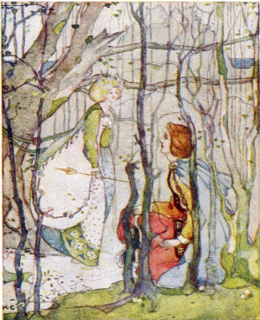Related Research Articles

Sir Thomas de Ercildoun, better remembered as Thomas the Rhymer, also known as Thomas Learmont or True Thomas, was a Scottish laird and reputed prophet from Earlston in the Borders. Thomas' gift of prophecy is linked to his poetic ability.
TamLin is a character in a legendary ballad originating from the Scottish Borders. It is also associated with a reel of the same name, also known as the Glasgow Reel. The story revolves around the rescue of Tam Lin by his true love from the Queen of the Fairies. The motif of capturing a person by holding him through all forms of transformation is found throughout Europe in folktales.
"The Cruel Mother" is a murder ballad originating in England that has since become popular throughout the wider English-speaking world.

"Young Beichan" is a ballad, which with a number of variants and names such as "Lord Baker", "Lord Bateman", and "Young Bekie", was collected by Francis James Child in the late 19th century, and is included in the Child ballad as number 53.

"Hind Horn" is a traditional English and Scottish folk ballad.
"The Earl of Mar's Daughter" is Child ballad number 270.
"Young Hunting" is a traditional folk song, Roud 47, catalogued by Francis James Child as Child Ballad number 68, and has its origin in Scotland. Like most traditional songs, numerous variants of the song exist worldwide, notably under the title of "Henry Lee" and "Love Henry" in the United States and "Earl Richard" and sometimes "The Proud Girl" in the United Kingdom.
King Estmere is an English and Scottish Child ballad and number 60 of 305 ballads collected by Francis James Child.
The Duke of Athole's Nurse is #212 of the Child Ballads, the collection of 305 ballads from England and Scotland, and their American variants, collected by Francis James Child in the late nineteenth century. The collection was published as The English and Scottish Popular Ballads between 1882 and 1898 by Houghton Mifflin in ten volumes and later reissued in a five volume edition.
The Duke of Gordon's Daughter is #237 of the Child Ballads, the collection of 305 ballads from England and Scotland, and their American variants, collected by Francis James Child in the late nineteenth century. The collection was published as The English and Scottish Popular Ballads between 1882 and 1898 by Houghton Mifflin in ten volumes and later reissued in a five volume edition.
"Rose the Red and White Lily" is Child ballad number 103.
"The Fair Flower of Northumberland" is a folk ballad.
Fause Foodrage is Child ballad 89, existing in several variants.
Willie and Earl Richard's Daughter is Child ballad 102.
Erlinton is #8 of the Child Ballads, the collection of 305 ballads from England and Scotland, and their American variants, collected by Francis James Child in the late nineteenth century. The collection was published as The English and Scottish Popular Ballads between 1882 and 1898 by Houghton Mifflin in ten volumes and later reissued in a five volume edition.
"Brown Robyn's Confession" is Child ballad 57.
Will Stewart and John is Child ballad 107, indexed as such in Francis James Child's 19th century collection of English and Scottish ballads.
Tom Potts is #109 of the Child Ballads, the collection of 305 ballads from England and Scotland, and their American variants, collected by Francis James Child in the late nineteenth century. The collection was published as The English and Scottish Popular Ballads between 1882 and 1898 by Houghton Mifflin in ten volumes and later reissued in a five volume edition.
"Bonnie Annie" is a folk ballad recorded from the Scottish and English traditions. Scottish texts are often called Bonnie Annie or The Green Banks of Yarrow, English texts are most often called The Banks of Green Willow. Other titles include The Undutiful Daughter, The High Banks O Yarrow, The Watery Grave, Green Willow, There Was a Rich Merchant that Lived in Strathdinah and The Merchant's Daughter.
The King of Love is an Italian fairy tale collected by Thomas Frederick Crane in Italian Popular Tales.
References
- ↑ "Child's Ballads/97" . Retrieved 14 February 2012.
- 1 2 Christie, William (1876). Traditional Ballad Airs, Volume 1. Edinburgh: Edmonston & Douglas. pp. 42, 136. Accessed 14 February 2012.